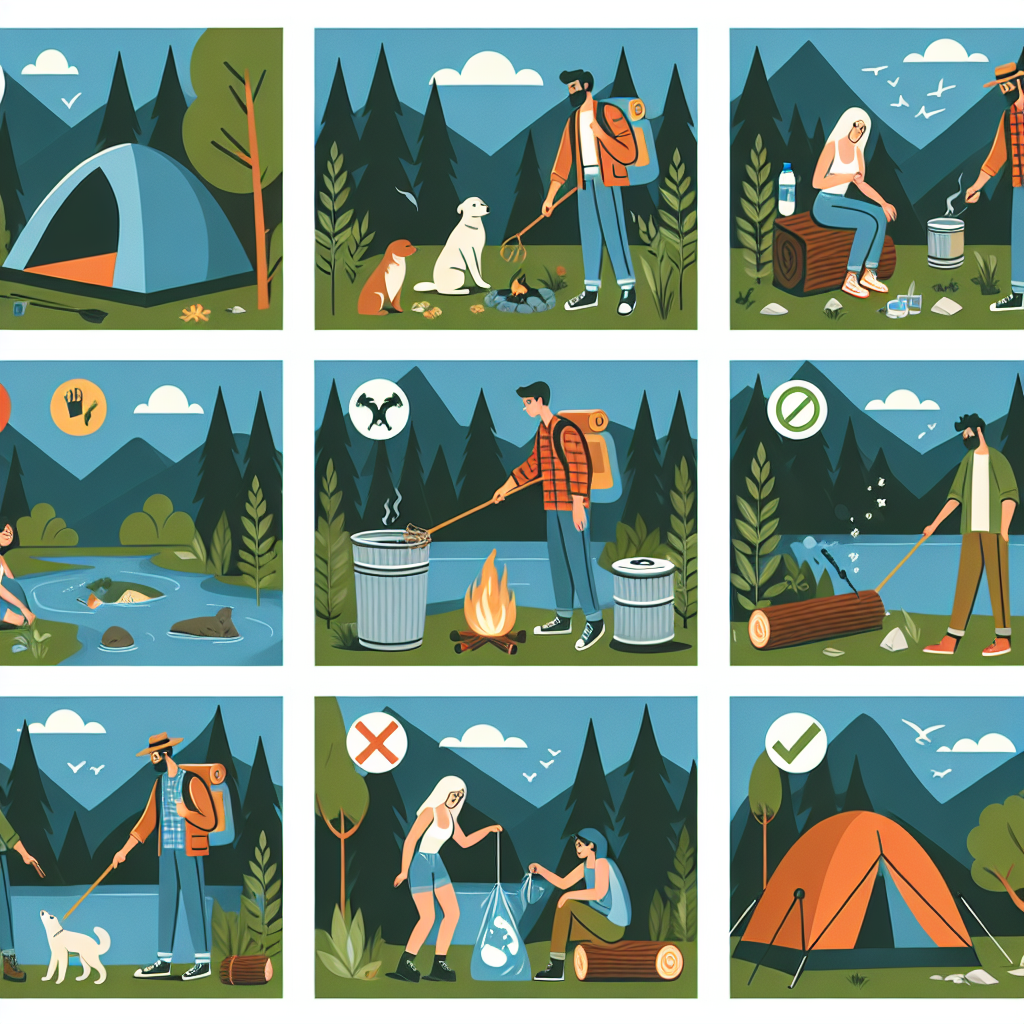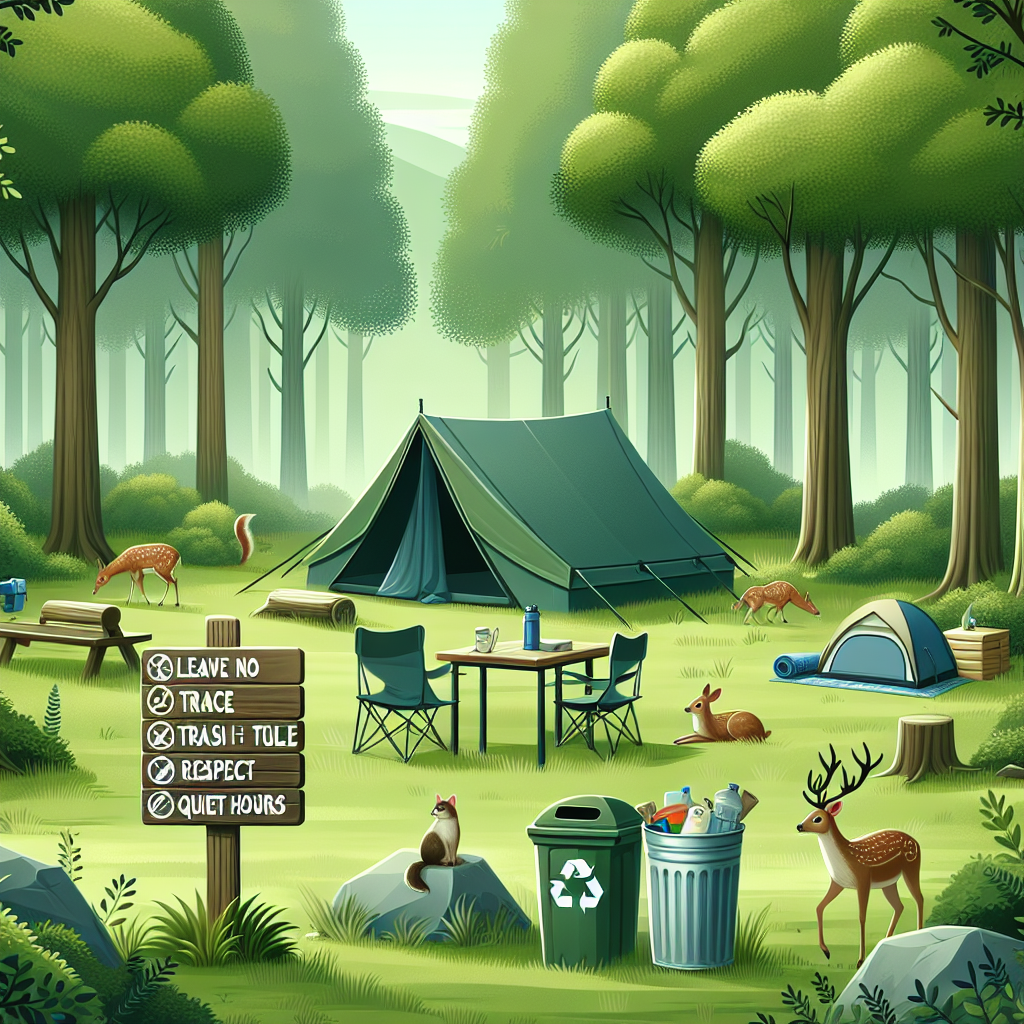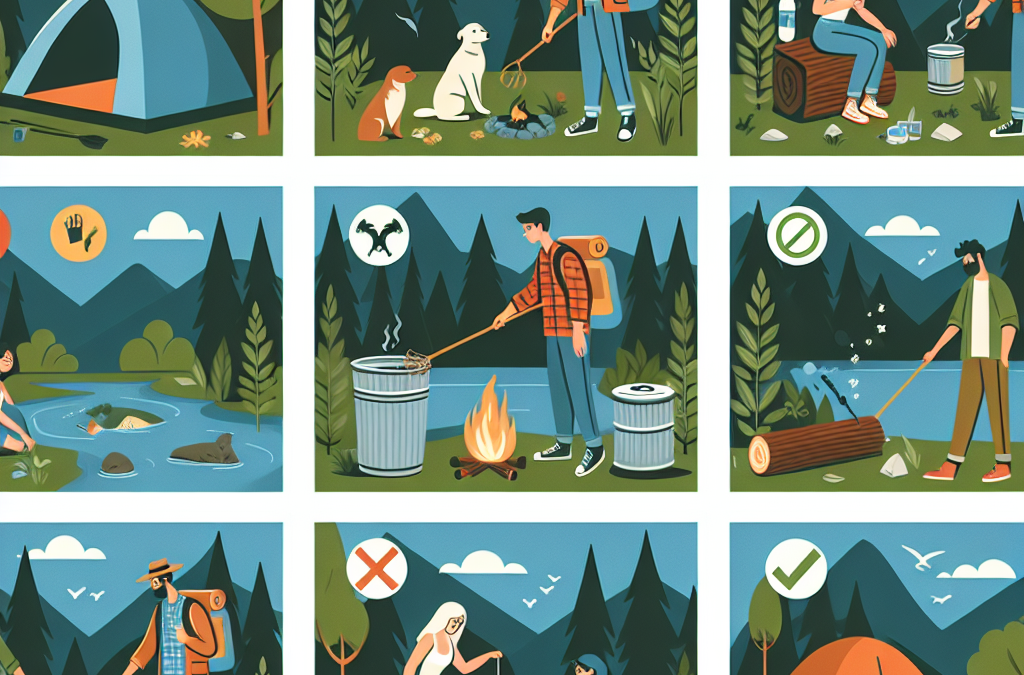Stepping into the great outdoors for a camping trip is an exciting adventure, yet it brings with it an inherent responsibility. “Outdoor Ethics: Respecting Nature and Fellow Campers” enlightens you on how to balance your enjoyment with the preservation of nature’s beauty and tranquility. It’s all about learning to respect your surroundings, minimize your impact on the environment, and act considerately towards your fellow campers. This piece imparts valuable insights and guidelines that you can adopt to ensure each camping trip is a positive experience for both you and the environment. So, grab a cozy blanket and a cup of hot cocoa as you discover the importance of outdoor ethics in this enlightening read.

Understanding the Importance of Outdoor Ethics
Outdoor ethics is essential for everyone who wishes to enjoy nature, whether through camping, hiking, or even a simple picnic in a park. It encompasses a broad range of behaviors and attitudes aimed at preserving the natural world and minimizing human effect on wildlife and nature.
Defining outdoor ethics
Outdoor ethics can be defined as a set of principles guiding us on how to behave in the outdoors, promoting sustainability, and respect for wildlife and fellow outdoor enthusiasts. It involves making conscious decisions to minimize our presence, protect our natural resources, and prevent disturbing wildlife.
Consequences of neglecting outdoor ethics
Neglecting outdoor ethics can lead to consequences like deforestation, soil erosion, water pollution, wildlife disturbance and even extinction of certain species. We might be denying future generations the chance to enjoy these natural wonders if we fail to uphold these necessary behaviors.
Benefits of practicing outdoor ethics
Practicing outdoor ethics benefits both you and the environment. It preserves the purity and sanctity of the outdoors, ensuring it can be enjoyed by future generations. Moreover, it can enhance your outdoor experience as you deepen your bond and respect for nature.
Principles of Leave No Trace
The Leave No Trace principle is a crucial aspect of outdoor ethics. It encourages individuals to minimize their impact on the environment, both for the preservation of wildlife and the enjoyment of future adventurers.
Overview of the ‘Leave No Trace’ concept
The ‘Leave No Trace’ concept involves eight principles that provide guidance on minimizing your impact on the environment. These principles suggest that if you are going to enjoy the great outdoors, you should do so responsibly, leaving it just as you found it.
Seven principles of ‘Leave No Trace’
Here are the seven principles of Leave No Trace: Plan ahead and prepare, travel and camp on durable surfaces, dispose of waste properly, leave what you find, minimize campfire impact, respect wildlife, and be considerate of other visitors. Each of these points is essential for a responsible and ethical outdoor experience.
Benefits of ‘Leave No Trace’
Practicing Leave No Trace principles helps preserve the environment, reduce damage to natural resources, prevent wildlife disturbances, and foster goodwill among outdoor enthusiasts. It enables individuals to experience nature in its rawest form without compromise.
Respecting Wildlife
Wildlife is an integral part of our outdoor experience. However, these creatures deserve respect and should not be disturbed in their natural habitats.
Do’s and Don’ts when encountering wildlife
When you encounter wildlife, you must keep your distance, avoid feeding them, and never touch or scare them. Remember, we are guests in their home, and it is crucial to respect their space and habits for their well-being.
Impact of human interaction on wildlife
Human interaction can be detrimental to wildlife in numerous ways. It can lead to changes in their behavior, affect their feeding and breeding habits, and make them susceptible to predators or disasters. Respecting wildlife is essential in preserving their existence and the balance of the ecosystem.
Promoting wildlife conservation while camping
You can promote wildlife conservation while camping by sticking to designated paths, avoiding sensitive habitats, and refraining from feeding, touching, or disturbing wildlife.
Proper Waste Disposal
Proper waste disposal is an essential aspect of outdoor ethics. It prevents pollution, protects wildlife, and helps maintain the natural beauty of the surroundings.
Importance of proper waste disposal
Managing waste properly is important to prevent soil, water, and air pollution, as well as deter pests. Irresponsibly discarded waste can also harm wildlife that might ingest it or become entangled.
Methods of disposing waste outdoors
When disposing of waste outdoors, use established waste receptacles or carry your waste with you until you find one. For solid human waste in remote areas, dig small “catholes” 6 to 8 inches deep in soil.
Impact of improper waste disposal on natural habitats
Incorrect waste disposal can destroy the beauty of natural habitats and harm plant and animal life. It unsettles the balance of the environment and creates health hazards that impact the ecosystem.

Minimizing Campfire Impact
Campfires are a traditional part of camping, but if not managed properly, they can be harmful.
Potential dangers of campfires
Improperly managed campfires can cause wildfires, scar the landscape, and impact wildlife. Moreover, leftover fire rings are unappealing and contrary to the Leave No Trace principle.
Sustainable campfire practices
The use of designated fire rings, keeping fires small, burning only sticks from the ground, and fully extinguishing the fire before leaving are the keys to sustainable campfire practices.
Alternatives to campfires
Consider alternatives to open fires, such as portable gas stoves, candles, or lanterns. They provide the necessary warmth and light with significantly less risk and impact on the environment.
Respecting Fellow Campers
An essential part of outdoor ethics involves respecting fellow adventurers, particularly in shared, common areas.
Understanding camper etiquette
Camper etiquette involves respecting others’ space, keeping noise to a minimum, and being courteous in shared facilities. It’s all about ensuring an enjoyable experience for everyone.
Maintaining noise levels
Reducing noise, particularly during quiet hours, shows consideration for other campers. Remember, many people go camping to enjoy peaceful surroundings.
Sharing camping resources responsibly
Sharing resources such as firewood, water sources, and shared space responsibly ensures that everyone can enjoy camping and nature together.
Managing Pets in the Outdoors
Bringing pets into the outdoors can bring joy, but also challenges that demand responsible management.
Challenges and considerations of bringing pets
Pets can disrupt wildlife, cause others discomfort, or even damage the environment if not managed correctly. Always check if pets are allowed and under what conditions.
Guidelines for managing pets
Keep your pet under control, preferably on a leash, pick up after them, and ensure that they do not chase or harass wildlife or other campers.
Potential detriments to nature and other campers
Uncontrolled pets can scare off wildlife, disrupt the peace, and create unpleasant situations for other campers. Some pets can even bring invasive species into the ecosystem.
Responsible use of Technological Devices
In the modern age, technology has become a part of outdoor activities, but it must be managed responsibly.
Detriments of inappropriate technology use
Inappropriate technology use can disrupt the tranquillity of the outdoors for others, and the light and noise could disturb wildlife.
Guidelines for responsible use of tech devices outdoors
Using headphones, keeping devices on silent, limiting usage time, and avoiding high-light settings are some ways to use devices responsibly in the outdoors.
Balancing the use of technology with respect for nature and others
While technology can enhance your outdoor experience, it should never create a disturbance for wildlife or fellow outdoor enthusiasts. Striking a balance is key.
Cultural Respect and Historic Preservation
Just as we respect nature, we should also show respect towards cultural and historical sites we encounter in the outdoors.
Understanding cultural sensitivity outdoors
Recognizing that certain sites or areas might hold cultural significance for indigenous communities or other groups is crucial.
Respecting historic or cultural sites
Leaving sites as they are, not removing any objects, and avoiding damage are key in respecting historic or cultural sites.
Impact of vandalism and unauthorized artifact collection
Vandalism and artifact collection not only disrespects cultural and historical importance but may also have legal repercussions. Even seemingly harmless actions can lead to significant damage over time.
Educating others about Outdoor Ethics
Spreading awareness about outdoor ethics is vital for the sustainability of natural areas for future generations.
Importance of spreading awareness
The more people adhere to outdoor ethics, the better the chance of conserving our natural spaces for future generations. Spreading awareness can multiply the positive impacts of your own responsible behavior.
Effective ways to educate others
Teaching by example, engaging others in conversations about nature conservation, and sharing experiences are effective ways to educate others about outdoor ethics.
Becoming role models for outdoor stewardship
By living out these outdoor ethics, you become a role model, inspiring others to follow suit and promoting a culture of respect and care for our natural world. It’s an opportunity to lead by example and invoke positive changes in outdoor stewardship.

